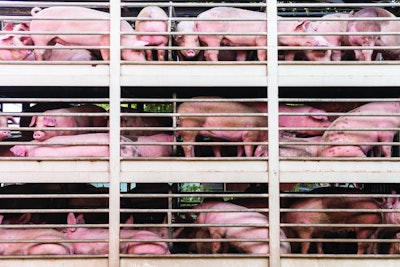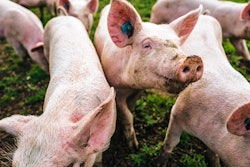
After some pigs imported live from Indonesia tested positive for the African swine fever (ASF) virus last week, Singapore immediately suspended the trade.
First cases of ASF have been detected in pigs in the Riau Islands province of Indonesia.
Last week, animals imported live from Bulan Island (Pulau Bulan) in this province were tested in a Singapore slaughterhouse. According to the Singapore Food Agency (SFA), the virus was detected in samples taken from animals on the production line.
On suspicion of the disease, the carcasses were removed from the abattoir. On confirmation of the results, the SFA has halted imports of pigs from Bulan, and the slaughterhouse has been cleaned and disinfected.
SFA stressed that ASF does not pose a threat to human health. While a short disruption to the pork supply in Singapore was expected, the authority said it was arranging supplies from other sources, of which it routinely uses around 20. With no domestic pigs reared in the island state, around 15% of its pork requirements are met through the import of live animals from Bulan in Indonesia. Other sources are pigs from the Malaysian state of Sarawak, or chilled or frozen meat from Australia, Brazil, Denmark or New Zealand.
Indonesia’s Riau Islands province lies between the islands of Sumatra and Borneo.
ASF confirmed on Indonesian farm
Since the discovery of the ASF virus in the imported animals in Singapore, The Jakarta Post has reported the detection of the virus in some carcasses from the Bulan Island farm. Managing around 240,000 pigs, the company previously supplied between 900 and 1,300 live pigs to Singapore. Few of the animals were eaten locally. Following veterinary advice, the authorities will consider whether to make these now-surplus animals available for local consumption.
ASF was first detected in Indonesia in 2019, according to the United Nations’ Food and Agriculture Organization (FAO) in its latest update on the ASF situation in Asia. From the first cases in North Sumatra, the virus has been detected in 18 of the country’s 34 provinces.
Since the start of this year, cases have been reported in the southernmost province of East Nusa Tenggara, South Sulawesi and Central Sulawesi. Most recent cases are reported in Northern Kalimantan, a province on the island of Borneo, according to the FAO.
Further ASF outbreaks in South Asia
In the Kingdom of Bhutan, pigs at two more farms have tested positive for the ASF virus. This is according to the latest notification from the South Asian nation’s veterinary agency to the World Organisation for Animal Health (WOAH).
Affected by these outbreaks were two farms of 624 and 1,055 pigs in Sarpang. Located in this southern district, the two premises lie close to India’s northern border. These bring to four the number of confirmed ASF outbreaks in this district, all on farms since the end of March. Directly impacted have been 2,355 pigs, 18 of which have died.
Meanwhile, Times of India reports heavy mortality among pigs at a small farm in the southern state of Kerala. More than half of the 90 pigs died at the premises in the Ernakulam district of the city of Kochi.
Source of the infection is thought to be infected food waste or contact with wild pigs. As the remaining animals are culled, and their carcasses buried, an office is set up to monitor pigs within a 10-kilometer radius of the outbreak.
Last confirmed cases in this area were in December 2022, according to this source.
Update on disease situation elsewhere in Asia
Since the first cases in 2019, the number of ASF-infected wild boar in South Korea has reached 3,086, according to Pig People (as of April 25). This is 43 more than the previous update 10 days previously. With no new outbreaks in domestic pigs, the total on South Korea farms so far this year remains at eight. These have directly affected 53,550 domestic swine.
So far this year, FAO reports that 81 ASF outbreaks had been confirmed in 26 provinces and cities in Vietnam (up to April 6). Directly affected as a result of mortality or culling have been 3,400 pigs.
In the Western Visayas region of the Philippines, only the provinces of Antique and Negros Occidental have not recorded any cases of ASF. According to the Philippine News Agency, authorities in Antique have set up a number of checkpoints on the provincial border operating 24/7. These aim to prevent the entry of the virus in infected swine or pork products.
In the Eastern Malaysia state of Sabah, a ban on hunting wild pigs remains in place, reports The Borneo Post.
Between February 2021 and August 2022, 20 districts were affected by the disease, according to the state agriculture minister. Although numbers have subsided since then, it is too early to re-issue hunting permits, he said. Anyone hunting without authorization risks a hefty fine.
In Hong Kong, ASF hit a small licensed farm in early February. According to the latest WOAH notification, no further cases have been detected in the territory in the meantime.
View our continuing coverage of the global African swine fever situation.
















